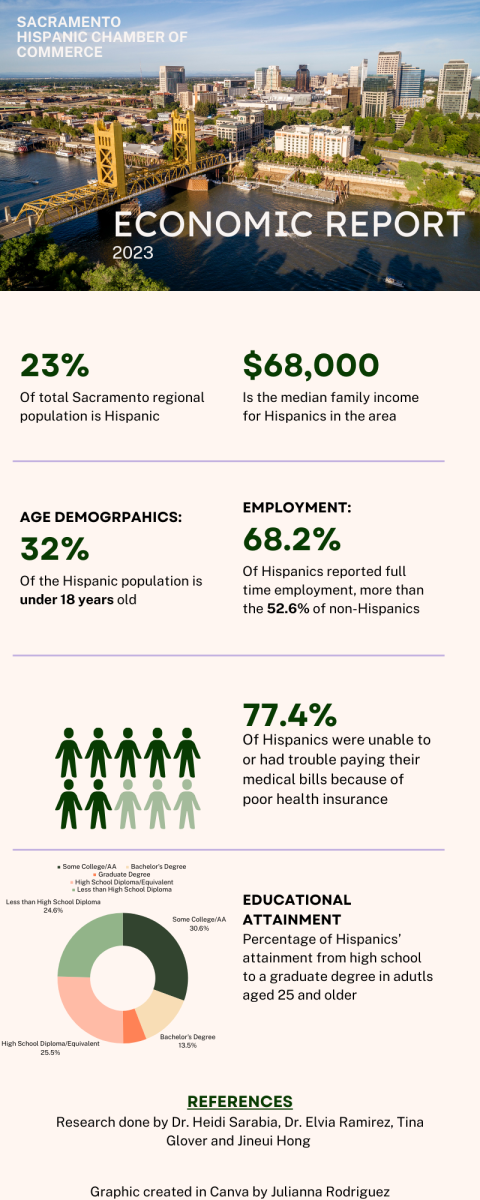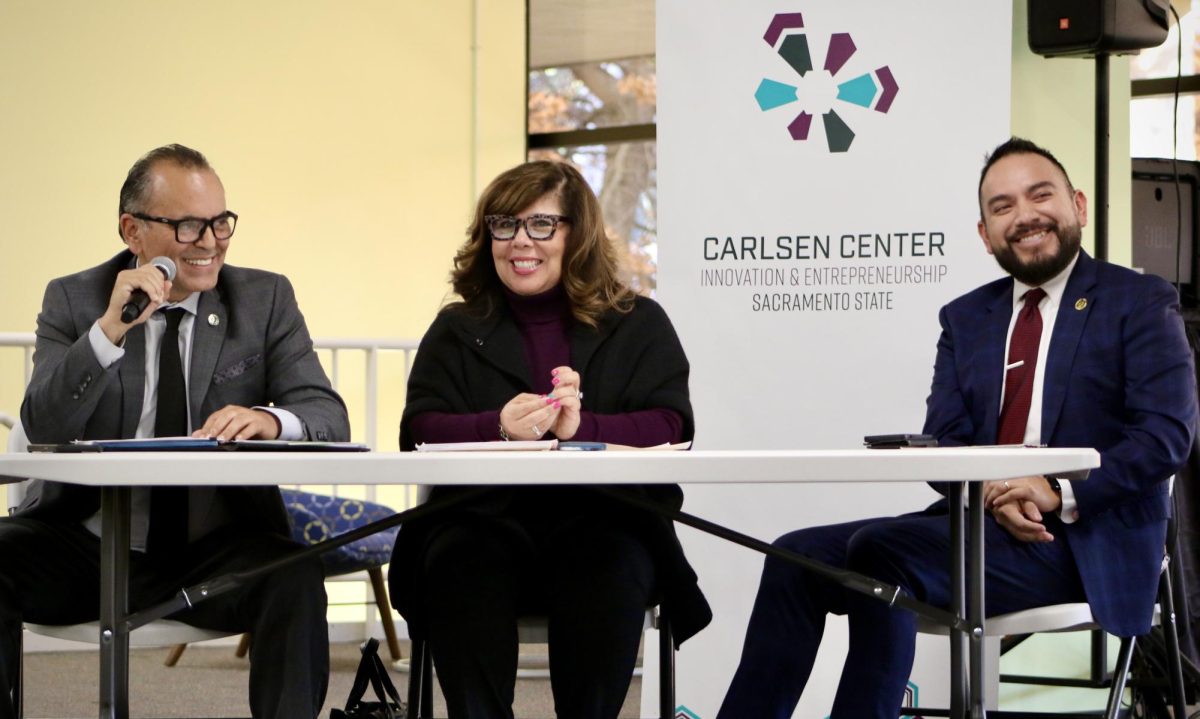Editor’s Note: The usage of Hispanic, Latino/a/e/x and Chicano/a/e/x is in accordance with the preference and language of the sources and/or organizations included in this story.
Sacramento State held a panel on Thursday in the Carlsen Center to discuss the findings from the 2023 Hispanic Economic Report and its impact on incoming students with representatives from the Sacramento Hispanic Chamber of Commerce and Sacramento Area Council of Governments.
The research for the report was done by Sac State professors Heidi Sarabia and Elvia Ramirez. Both professors are faculty associates for the university’s Center on Race, Immigration and Social Justice and have worked to mentor Hispanic students pursuing a higher education.
The updated economic report was commissioned in 2021 by Juan Novello, the vice president of the Sacramento Hispanic Chamber of Commerce who funded their research with grants given to Sac State.
Sarabia went over the specific economic disparities from the report stating that Latinos were hit the hardest by the pandemic and were the highest percentage in Sacramento to report pay cuts.
“In 2019, Pew Research Center reported that Latinos were doing better, in terms of going back to the same levels of economic wealth before the 2008 recession,” Sarabia said.
Sarabia said that this progress to catch up was made by immigrant Latinos who overcame the language barrier to excel in their field. However, native-born Latinos with no language barrier were still experiencing a large disparity between them and non-Hispanics, showing that there were other mechanisms at play keeping Latinos out of these economic opportunities.
RELATED: ‘We are very diverse’: Sac State professor reflects on migrant upbringing and overcoming adversity
Since many Latinos work in certain fields such as labor, cleaning and maintenance, an overwhelming majority of residents in Sacramento reported not having a retirement account or health insurance plan because they weren’t offered one.
When discussing the report’s findings on healthcare disparities within the Latino community, Ramirez said many Latinos were unaware of the coverage they’re eligible for under the Affordable Health Care Act.
“Hispanics were more than twice as likely than non-Hispanics to report that somebody in their household had a medical bill that they could not pay,” Ramirez said. “It really speaks to the issues of socio-economic disadvantage that Latino households encounter here in the Sacramento region.”
Jineui Hong, senior analyst for the Sacramento Area Council of Governments, was in charge of providing area-specific data to serve as the basis for Ramirez and Sarabia’s work and said the majority of her data came from the census conducted every ten years plus information from data.gov.
Hong said Hispanic data is often grouped together with other minorities, so there are usually many people missing from the data for the Latin community. This lack of data gets in the way of helping these communities get proper funding from grants meant to help families facing financial hardships.

While a majority of the discussion was about the report’s findings and what it meant for the Sacramento area as a whole, there was also discussion over how this directly affects Sac State and its students.
Rita Gallardo-Good, associate vice president for Public Affairs and Advocacy said that these economic hardships are the reason behind so many Latinos deciding against college and opting to go straight into the workforce.
Gallardo-Good said the way to combat this is to start advocating for higher education earlier than high school. Also, ensuring students who are in college have the means to succeed post grad by providing them with opportunities and partnerships with community members, she said.
Interim Vice President of Student Affairs Carlos Nevarez said there will be a Hispanic Serving Institution Director to oversee implementation strategies this spring, as well as cluster hires done to improve representation among faculty.
“We made a promise to advance and to better resource, particularly the Latinx student community,” Nevarez said. “It shows our commitment to not only saying we’re gonna increase enrollment but ensuring that once we get them here, they’re retained and successful.”
Michelle Pacheco, a fourth-year sociology major, said the panel was incredibly informative and seeing it being accurately represented by Hispanic faculty members was really great. Pacheco said a previous class with Sarabia inspired her to pursue her master’s degree and make a difference.
“I come from a Latin family so I understand the struggles and it’s great that we’re being advocated for to have more opportunities,” Pacheco said.
Sarabia said all of this work is made possible by the support they received from resources such as the grant given by the chamber and without them there would be little opportunity for people to have a chance to conduct and discuss this research.
“We want to be at the table, but we also want to be supported to be at the table for decision-making,” Sarabia said.

































































































































